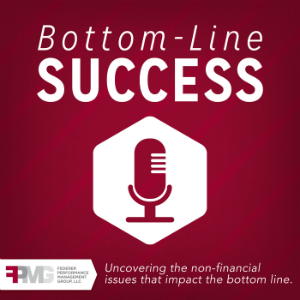Emily Von Sydow: Hello, and welcome to Bottom-Line Success with Denise Federer. The podcast that guides successful business advisors, and family business executives, to be their very best. I’m your announcer, Emily Von Sydow.
Today we’re going to talk about gender communication differences. Denise, one of your most popular blog posts is on the differences, and how each gender communicates. In your post, you mentioned that women often feel excluded and isolated in board meetings. What are some examples of situations that women experience?
Denise Federer: Actually I had a very recent example of a woman that I coached at a Fortune 500 company. She is a director of a huge division, vice president. She was at a leadership meeting where they were discussing some very controversial approaches to how they wanted to move forward with their business plan. She voiced her opinion and she shared with me that she got absolutely no response. People didn’t agree, people didn’t disagree, they actually acted as if she hadn’t even said anything.
Well her colleague was sitting right next to her, a gentleman, reiterated what she said about ten minutes [later], and people were in awe of how brilliant his comments were. She said he actually texted her, “Can you believe that just happened?” He was even aware of it. That for some reason when she expressed it, most of the other people in that room, in fact I believe all of the other people in that room, were men. Without even being aware of it, her voice was discounted. That was one of her goals, is how could she get her voice heard more effectively in these meetings. Which really prompted me, in many ways, to write this actual blog.
EVS: That is a really profound example, it really highlights what women experience. Now just to put all of this in perspective, why does it matter that women experience these situations? In fact, why does it matter whether women are equally represented or we’re not?
DF: Well I think that it matters that everybody who sits at a table, in a business setting, gets their voice heard. Hopefully each person is adding a contribution. I think even further than that, I think the diversity and how men and women perceive situations and perspectives as greatly both to the qualitative experience in a business setting, and as importantly to the bottom line. The research backs that up, that women have a great impact when they’re in a leadership role, on how a business and a corporation does. When men are interviewed on these experiences, they’re fairly oblivious. It’s not intentional to ignore women, it’s just that it becomes a pattern of behavior, that a lot of people aren’t even aware they’re engaging in.
EVS: That’s so interesting that men aren’t even aware of it. Why do you think that is that they don’t even … it just doesn’t enter their mind.
DF: I think there’s always … we tend to connect with people that we’re more similar with. Also, men and women speak in a different voice. That was in the blog as well. Men and women use different language. We’ve talked about intention, women often communicate in a way that speaks to trying to have connections and interaction. Where men are much more finite in their conversations, they’re all about independence, and they’re all about making statements that sound very factual without looking for approval.
EVS: Exactly. You said that men’s goals in conversations tend to be maintaining the upper hand, and achieving independence; whereas, women want connections and closeness. Is one way better than another or are they equal?
DF: I really believe that there isn’t one way that’s better than another, but it’s important that we open up our possibilities to be inclusive with both strategies. Some of the ways that men speak though, just tend to exude more confidence, and can be a little bit more powerful. They’ll often use pronouns of ‘I’ more often, where women will use ‘we’ and ‘us.’. When men use the word ‘I’ it often makes women feel excluded from a conversation. Also, men tend to speak in absolutes.
Again, all of these are generalizations, but men tend to speak in absolute, where women find that at times very patronizing. Finally, I think that the way that women communicate often is in much more detail. Where men often are looking for more of the big picture. Women can lose their male audience when they are too finite in details and not getting to the end point quickly enough.
EVS: That’s actually really interesting, because even as you’re describing how men communicate using the pronoun, ‘I’ as opposed to ‘we’ and getting right to the point. In my mind, as I’m hearing that, I think, “Oh yeah, that sounds like someone who’s a lot more absolute rather than talking about details and using the pronoun, ‘we’.” Do you think that society has just trained us to think that the way men communicate is absolute or do you think that’s something that we naturally feel?
DF: Well as a behavioral psychologist, I’m a firm believer that individually we certainly come into this world genetically predisposed, but we are absolutely shaped and molded by our experiences both family-wise and collectively in society. I do think there’s a great difference in socialization between men and women. Women learn to respond a certain way, and men do as well. When you look at all those comedy shows that we all think are so funny, that express the difference between men and women, and books that are read. Clearly we all identify that men and women approach the world differently, from a different view point.
I have someone who once summed it up, is that, “Just tell me the time, don’t build me a clock.” In terms of how women and men communicate differently. I think that women [who] want to communicate more effectively have to be aware of … just as all people have to be aware of how are they being perceived. It isn’t just a gender issue. It’s if I want to communicate effectively, it’s not so much my intent that matter, but more how I am received.
EVS: Are these certain situations in which women’s preferred or natural method of communication are more effective than how men tend to communicate or vice versa?
DF: Well I certainly think … I do a tremendous amount of work in the financial industry. I think when people are talking about their money, and sensitive issues that make them vulnerable. A female approach to communication can be often much more user friendly, and allow people to open up more and speak in much greater depth. However, in a business setting, where people are not as willing to risk being vulnerable, understanding the differences and how you want to communicate can be very powerful in getting your voice across, and making sure your agenda is addressed.
EVS: Interesting, so if people are open to being vulnerable in the situation, then a women’s natural mode of communication tends to be more effective. That’s really interesting.
DF: That is certainly my take on it. You have to understand the environment that you’re in and what the goals are.
EVS: Definitely.
DF: Often you have to realize too, when people are in business meetings, their focused, busy, and ready to get on to the next event. It’s very different than having a leisurely conversation about the meeting of a particular topic.
EVS: Now what about bargaining situations. Because I know men and women tend to negotiate very differently, is there one situation in which one natural mode of communication makes more sense?
DF: Well I certainly think, and the research would bare this out, it’s not that women aren’t capable of bargaining effectively. I do believe that women, at times, hedge on being more assertive for fear of being perceived as being too aggressive. Also, coupled with their need for social approval, which women tend to seek that out more than men, it can be a bit of a handicap. Interestingly enough, as a rule, women don’t really have a problem negotiating for someone else. It’s when they need to negotiate or promote themselves, or look for an opportunity to advance their own cause, that they’re a little bit more uncomfortable.
EVS: That makes sense. It’s interesting you mentioned that women are afraid of being perceived as too aggressive. Why do you think that is?
DF: Well that’s an age-old issue that we’ve all been trying to tackle from this field for awhile, is why is it when women communicate directly they’re seen as aggressive, and when men do it they’re seen as powerful? I don’t have the final answer on that, and I do believe that has a lot to do with socialization and a need that people often have for women to communicate it, themselves directly, but non-aggressively.
I think that that leads into why sometimes women hold back in communicating directly what they want, hoping to get picked, or noticed or rewarded due to their accomplishments, without marketing themselves or informing people of what they want. Where men seem to be much more comfortable with that. In layman’s terms we often say, “Being more political in a work environment.” That is somewhere where women struggle and need to get more confident in how to communicate their needs, personally and professionally, of what they want and what their goals are.
I’m obviously not pulling on any research or saying anything, but I think these are some of the obvious things that we observe in the work environment, but we could do something about it.
EVS: Definitely.
DF: If you make a conscious decision, but you also have to have a comfortable style. You have to find a way to communicate in a style that speak to your truth and who you are and what feels right for you.
EVS: You mentioned that women actually can be quite successful at negotiating for others. How is it that they’re more successful and why do you think that is?
DF: Well I think that, and again these are generalizations, that women have a tremendous ability to be empathetic and understand what is important to other people. Have a way of communicating that, that can be non-threatening. It doesn’t mean you’re weak if you’re not aggressive or attacking someone. In fact, by expressing what the person you’re negotiating with needs and wants and picking up on the cues of what’s important to them. That is a very effective way to get your point across and get what you need. I think women can be very good at that, in terms of assessing what other people want and need, and how to get, accomplish their goals in that regard.
EVS: Just to wrap up here. What’s one specific piece of advice for overcoming gender communication problems, that women can take from this podcast and start implementing in the workplace tomorrow morning?
DF: I think if you’re a women who believes you’re struggling to have your voice heard in the workplace, I think you have to ask yourself, “What can I do differently, and what am I willing to do differently to embrace some strategies, to empower myself.” I think the most important first step is looking at your own behavior, to see if you’re inadvertently sending a message that frustrates others or tends to get you excluded as a conversational partner, resulting in your voice not being heard.
For example, when you look at voice quality and tone, I have noticed that often women who don’t feel as confident, will end their sentences in a question. Which doesn’t come across as confidently as they would like. Another woman that I work with, who’s quite bright and quite talented, she thinks out loud. All the [questions] that she’s considering the pros and cons, she’ll say them out loud; giving people the implication that she is not confident. Where really she’s just going through a decision-making process, that would be better left silent or in her hear of with a close peer or thinking partner prior to attending a meeting.
I think being aware of who are, what’s your style, opening up to the possibility that some of the things you’re saying may inadvertently cause you to be discounted. Then prioritizing the behaviors that you want to engage in. Being aware of your language and using powerful words, and dropping qualifies like ‘perhaps’ or ‘maybe’ which allow you to sound more tentative. Then taking note of your tone, inflexion, and body language. All things that summarize a confident person who has something that we all need to stop and listen to.
Finally, I think just be very aware of what your needs are. If you want something, ask for it. If you want people’s attention, you want to hold their attention, then you have to pick up on the behavioral cues of whether or not you in fact have their attention. If not, make the appropriate adjustments.
EVS: It all comes back to being self-aware, and being aware of how others react to you.
DF: Absolutely, that’s it. You summed it up great.
EVS: What about for men, because we don’t want to exclude them from this podcast. What’s your advice for helping them communicate more effectively with women?
DF: Again, and you summed it up beautiful. Being aware of your own behavior is the very flirts step in behavior change, and it’s critical. The number one thing I can ask men to do is, after listening to this podcast, say, “Have I fall victim to some of these stereotypes, and have I discounted people whose content would be brilliant and advance my cause? Because of their style I shut them down.” Then take a moment to make that extra effort to hear what they’re saying.
EVS: Excellent, that’s great advice; both for men and for women. Well that wraps up our podcast for today. Be sure to check out federerperformance.com, to check out more of Denise’s insightful blog posts. We’ll talk to you next time, thanks for listening.
This transcript has been edited for clarity.








